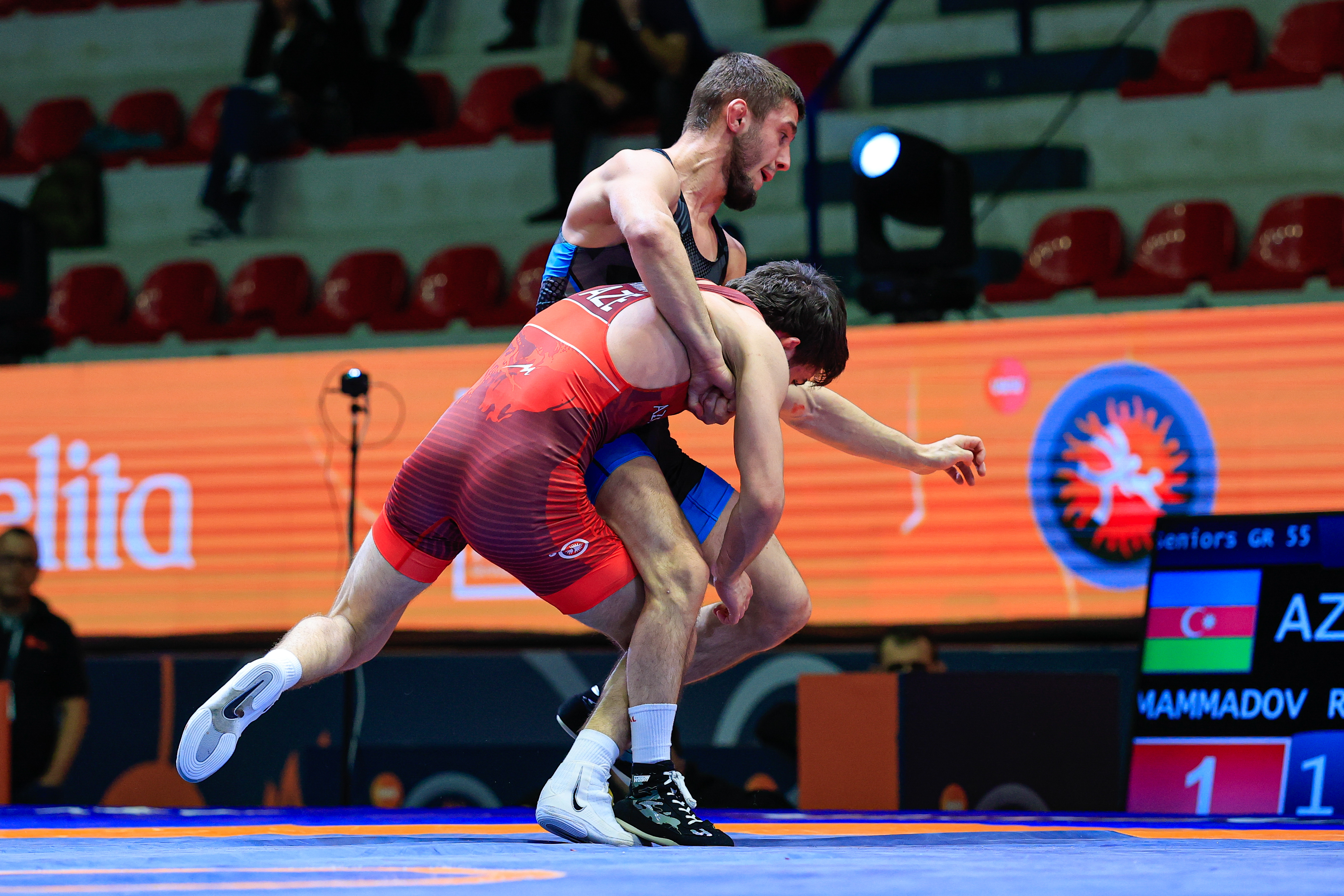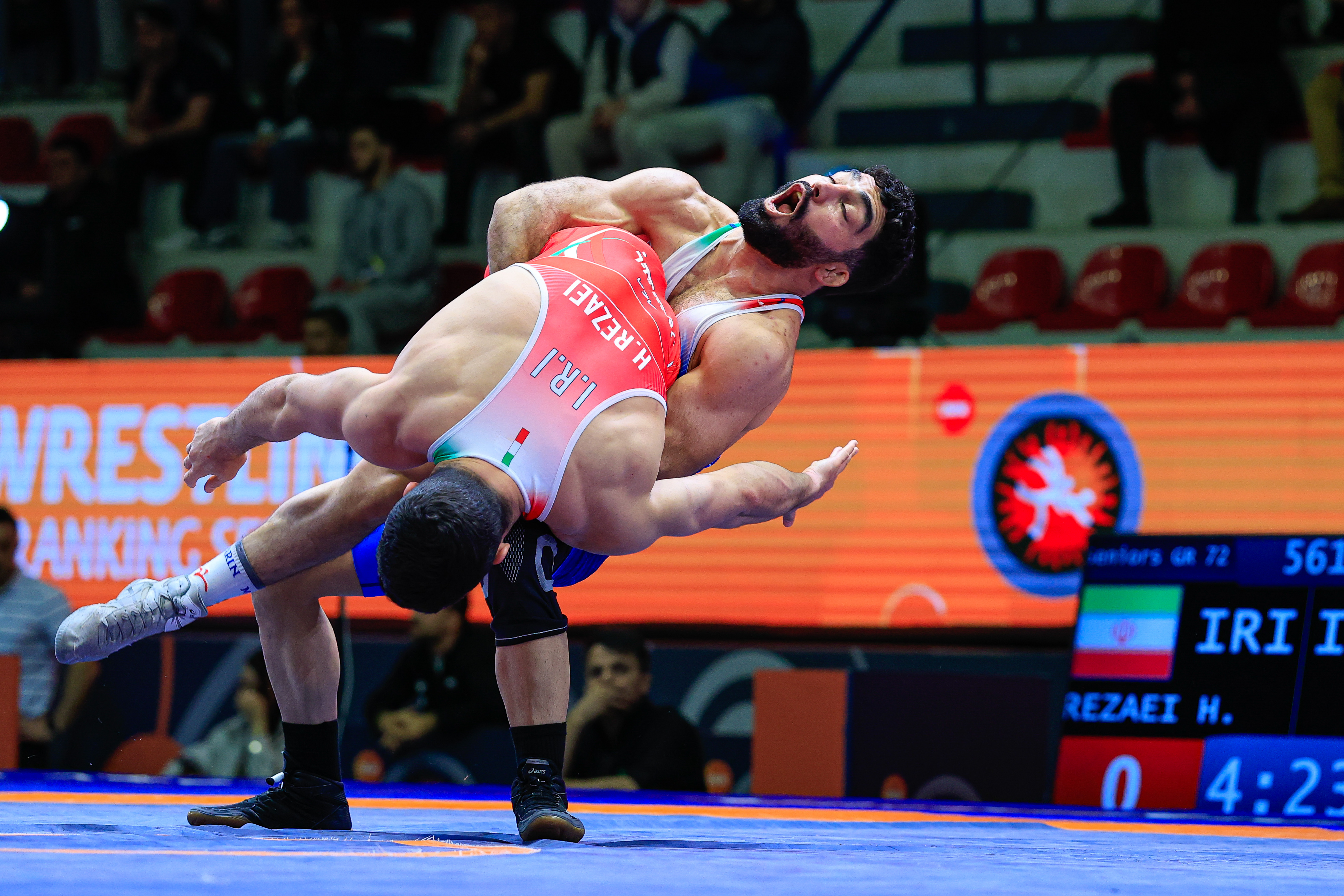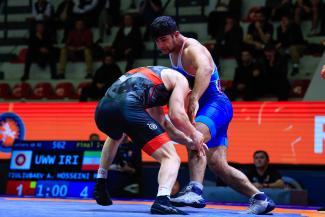Morning Session Highlights
15:50: 130kg semifinals - Murat KAMPAROV (UWW) will take on Konsta MAEENPAEAE (FIN) in the 130kg final after he defeated Beka KANDELAKI (AZE), 1-1. Maeenpaeae scored a quick 8-0 victory over Dzmitry ZARUBSKI (UWW) in the other semifinal.
15:40 - 97kg semifinals - World silver medalist Artur SARGSIAN (UWW) moves into the final with a 3-2 victory over the very impressive Amirreza MORADIYAN (IRI). Sargsian held only a 1-1 criteria lead before Moradiyan got whizzed for four points from Sargsian. Iran challenged the call and won but it only changed the score to 3-1. Moradiyan scored a stepout but it was too little too late. Sargsian will face world bronze medalist Kiryl MASKEVICH (UWW) in the final after he scored a electric 7-1 win over Giorgi MELIA (GEO).
15:25: 82kg semifinals - Amin HOSSEINI (IRI) beats Kamal BEY (USA), 7-0, at 82kg after scoring a four-pointer in the first period and then a takedown in the second. He will face Adlet TIULIUBAEV (UWW) for the gold medal after he held off Tunjay VAZIRZADE (AZE), 4-1, with all points being non-action points. Tiuliubaev led 2-1 when he scored a stepout from par terre in the second period. Vazirzade challenged the call and asked for two points for himself but lost it. Tiuliubaev scored a stepout to extend his lead to 4-1. A failed attempt from Vazirzade sees him being slammed on the mat as Tiuliubaev wins 6-1
15:10: 72kg semifinals - An all-Iran final at 72kg after Javad REZAEI (IRI) wins his semifinals, 5-1, against Razzak BEISHEKEEV (KGZ). Rezaei scored two turns from par terre in the par terre and then did well to defend in the second. Beishekeev tried to do a flying squirrel but did not score any points. In the other semifinal, Hojat REZAEI (IRI) managed a controlled 7-3 victory over Ruslan NURULLAYEV (AZE) to enter the final.
14:55: 60kg semifinals - Nihad GULUZADE (AZE) books a place in the final after a thumping 8-0 victory over Sadyk LALAEV (UWW) at 60kg. He opened the scoring with a stepout before getting the par terre position to lead 2-0. Three gut-wrenches get the job done for him. He will face compatriot Nihat MAMMADLI (AZE) in the final after the European champion defeated Suner KONUNOV (UWW). Mammadli scored a stepout to lead 1-1 at the break, then got a takedown to start the second and extend the lead to 3-1. He defended the lead to win
14:40: 55kg semifinals - Emin SEFERSHAEV (UWW) enters the final after a dominant 10-1 victory over Vishvajit MORE (IND). He used two throws, a takedown and turn to score his points. He will face Rashad MAMMADOV (AZE) for the gold medal after he held off LALIT (IND), 6-5, in the other semifinal. Mammadov led 3-2 when Lalit got the par terre in the second period to lead 3-3 on criteria. He managed to score two points for exposure but Mammadov got a reversal and completed a correct throw to lead 6-5, the winning score
14:20: Ali ILIASOV (UWW) must be gutted after that loss to Beka KANDELAKI (AZE). The U20 world champion scored a takedown and got a point for Kandelaki's passivity in the first period to lead 3-0. Kandelaki got the par terre in the second and after a long time on top, managed to turn Iliasov and lead 3-3 on criteria. With ample time left, Iliasov waited for his options before he managed to get behind Kandelaki and was about to lock his hands when the Azerbaijan wrestler flung him away from his back and was given two points. Iliasov challenged it and the 2 points were changed to 4 points which results in a 7-3 lead for Kandelaki. He won the quarterfinals at 130kg with the same score
14:00: World silver medalist Artur SARGSIAN (UWW) with a technical superiority win over Olympic bronze medalist Uzur DZHUZUPBEKOV (KGZ) at 97kg. Sargsian scored a takedown and then lifted Dzhuzupbekov and slammed him back first for four points and a 6-0 lead. He gets the par terre in the second period and turn close to the edge to complete a 9-0 win.
13:50: Nihat MAMMADLI (AZE) blanks Yerbol KAMALIYEV (KAZ), 6-0, at 60kg. He scored two turns from par terre in the first period to lead 5-0 and then again got a stepout early in the second period to win 6-0
13:45: Kiryl MASKEVICH (UWW) with an 1-1 victory over Alex SZOKE (HUN) at 97kg. Maskevich got the criteria since he received par terre advantage in the first period against Szoke, who won the Zagreb Open three weeks ago.
13:35: Tunjay VAZIRZADE (AZE) stuns Akzhol MAKHMUDOV (KGZ) at 82kg. While Makhmudov did not give up any points when he was put in par terre in the first period, Vazirzade scored four points via a body throw in the second to lead 5-0. That also made him avoid being called passive in the second period. Makhmudov with a late takedown but Vazirzade wins 5-2
13:20: Kamal BEY (USA) with an upset win over Olympic silver medalist Demeu ZHADRAYEV (KAZ) at 82kg. Zhadrayev was leading 3-1 but Bey with a drag and takedown to lead 3-3 on criteria with 20 seconds left to win and advance to the next round.
13:00: Beka KANDELAKI (AZE) scores three turns from par terre and then holds off Alimkhan SYZDYKOV (KAZ) to win their 130kg 7-3. With Fardin HEDAYATI (IRI) pulling out due to health issues, Kandelaki is the favorite to win the gold here.
12:50: U20 world champion Ali ILIASOV (UWW) downs Sarkhan MAMMADOV (AZE), 3-1, at 130kg with a two-point turn from par terre to win his first bout in Tirana. Can he go all the way here?
12:35: Olympic bronze medalist Uzur DZHUZUPBEKOV (KGZ) gets a four-pointer to start his bout at 97kg against Amanberdi AGAMAMMEDOV (TKM) and then scores two turns from par terre to complete a 9-0 victory.
12:20: World bronze medalist Kiryl MASKEVICH (UWW) completes a very cool and composed victory at 97kg over Iussuf MATSIYEV (KAZ). Maskevich defended when he was put in par terre in the first and then used a suplex in the second period to win 5-1
12:14: World silver medalist Artur SARGSIAN (UWW) used a side suplex and gut-wrench exposure to score his 8-0 win over Michial FOY (USA) at 97kg. He takes only one minute and 50 seconds to advance to the next round.
12:12: World bronze medalist Murad AHMADIYEV (AZE) falls to Giorgi MELIA (GEO) at 97kg. Ahmadiyev had scored a point using a reversal to lead 2-1 but gave up a stepout with 22 seconds left which gave Melia the lead and the victory.
12:10: U20 world bronze medalist and one of the rare Greco talent from India SURAJ (IND) starts with a 3-1 victory over Dimitri KHACHIDZE (GEO) at 60kg. He got a turn in the first period from par terre while Khadhidze did not when he got par terre in the second period.
12:00: Vakhtang LOLUA (GEO) feels the heat at 60kg as Yerbol KAMALIYEV (KAZ) beats him 8-7. Kamaliyev got the par terre in the first period and he scored three turns using front chest-wrap. Lolua managed to block him once during the sequence and was awarded two points but the Kazakhstan wrestler lead 7-2 at the break.
Lolua got his chance in the second period and scored a turn. He scored the second as well but Kamaliyev never came in neutral position. Lolua challenges, asking for points for the second turn but he loses the challenge which gives Kamaliyev a 8-5 lead. Lolua did manage a takedown with 8 seconds left but still could not over turn the result. Georgia would think about that challenge considering it was evident Lolua did not get the second turn completely.
11:40: European champion Nihat MAMMADLI (AZE) begins with an 8-0 technical superiority over Maxwell BLACK (USA) at 60kg. He will in all likelihood get 55kg world champion Vakhtang LOLUA (GEO), who is moving up, next.
11:30: Demeu ZHADRAYEV (KAZ) finds a way to beat Dmitrii DZHIOEV (UWW) at 82kg. Dzhioev led 1-1, holding criteria when he was given the third par terre, which is without points, but fails to score and it is Zhadrayev, the Olympic silver medalist at 77kg, who scores and wins.
11:20: Former world champion Akzhol MAKHMUDOV (KGZ), up at 82kg, begins with a close win over Dias KALEN (KAZ). Makhmudov was cautioned when he committed a defensive leg four on Kalen in par terre, giving Kalen a 3-0 lead. Makhmudov then scored a stepout to get one points. When he was given the par terre in the second period, he turned Kalen to make it 4-3 and defended that score to win.
11:10: Almost two years after his last competition, Viktor NEMES (SRB) was just 20 seconds away from making a winning start. But, Amin HOSSEINI (IRI) comes out with a suplex for four points to beat the Serbian 5-2 at 82kg.
10:50: In the first top match of the day, world silver medalist Artur SARGSIAN (UWW) takes out Mahammad AHMADIYEV (AZE) at 97kg. Sargsian led only 3-2 at the break but he launched a big four-pointer at the start of the second period and led 7-2, all but making it out of reach for Ahmadiyev.
10:30: A big day ahead in Tirana with six Greco weight classes in action -- 55kg, 60kg, 72kg, 82kg, 97kg and 130kg.




 Emin SEFERSHAEV (UWW) sets up a throw on Rashad MAMMADOV (AZE) during the 60kg final. (Photo: United World Wrestling / Kostadin Andonov)
Emin SEFERSHAEV (UWW) sets up a throw on Rashad MAMMADOV (AZE) during the 60kg final. (Photo: United World Wrestling / Kostadin Andonov) Javad REZAEI (IRI) hits a four-point throw on Hojat REZAEI (IRI) during the 72kg final. (Photo: United World Wrestling / Amirreza Aliasgari)
Javad REZAEI (IRI) hits a four-point throw on Hojat REZAEI (IRI) during the 72kg final. (Photo: United World Wrestling / Amirreza Aliasgari)

Share your thoughts.
Comments